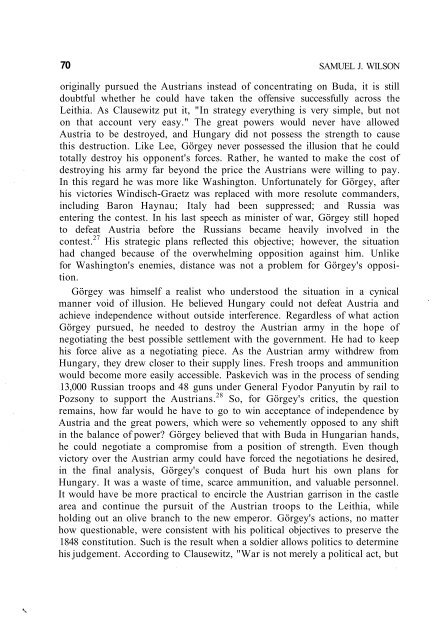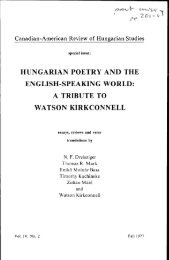HUNGARIAN STUDIES 11. No. 1. Nemzetközi Magyar ... - EPA
HUNGARIAN STUDIES 11. No. 1. Nemzetközi Magyar ... - EPA
HUNGARIAN STUDIES 11. No. 1. Nemzetközi Magyar ... - EPA
- No tags were found...
You also want an ePaper? Increase the reach of your titles
YUMPU automatically turns print PDFs into web optimized ePapers that Google loves.
70 SAMUEL J. WILSO<strong>No</strong>riginally pursued the Austrians instead of concentrating on Buda, it is stilldoubtful whether he could have taken the offensive successfully across theLeithia. As Clausewitz put it, "In strategy everything is very simple, but noton that account very easy." The great powers would never have allowedAustria to be destroyed, and Hungary did not possess the strength to causethis destruction. Like Lee, Görgey never possessed the illusion that he couldtotally destroy his opponent's forces. Rather, he wanted to make the cost ofdestroying his army far beyond the price the Austrians were willing to pay.In this regard he was more like Washington. Unfortunately for Görgey, afterhis victories Windisch-Graetz was replaced with more resolute commanders,including Baron Haynau; Italy had been suppressed; and Russia wasentering the contest. In his last speech as minister of war, Görgey still hopedto defeat Austria before the Russians became heavily involved in thecontest. 27 His strategic plans reflected this objective; however, the situationhad changed because of the overwhelming opposition against him. Unlikefor Washington's enemies, distance was not a problem for Görgey's opposition.Görgey was himself a realist who understood the situation in a cynicalmanner void of illusion. He believed Hungary could not defeat Austria andachieve independence without outside interference. Regardless of what actionGörgey pursued, he needed to destroy the Austrian army in the hope ofnegotiating the best possible settlement with the government. He had to keephis force alive as a negotiating piece. As the Austrian army withdrew fromHungary, they drew closer to their supply lines. Fresh troops and ammunitionwould become more easily accessible. Paskevich was in the process of sending13,000 Russian troops and 48 guns under General Fyodor Panyutin by rail toPozsony to support the Austrians. 28 So, for Görgey's critics, the questionremains, how far would he have to go to win acceptance of independence byAustria and the great powers, which were so vehemently opposed to any shiftin the balance of power? Görgey believed that with Buda in Hungarian hands,he could negotiate a compromise from a position of strength. Even thoughvictory over the Austrian army could have forced the negotiations he desired,in the final analysis, Görgey's conquest of Buda hurt his own plans forHungary. It was a waste of time, scarce ammunition, and valuable personnel.It would have be more practical to encircle the Austrian garrison in the castlearea and continue the pursuit of the Austrian troops to the Leithia, whileholding out an olive branch to the new emperor. Görgey's actions, no matterhow questionable, were consistent with his political objectives to preserve the1848 constitution. Such is the result when a soldier allows politics to determinehis judgement. According to Clausewitz, "War is not merely a political act, but
















